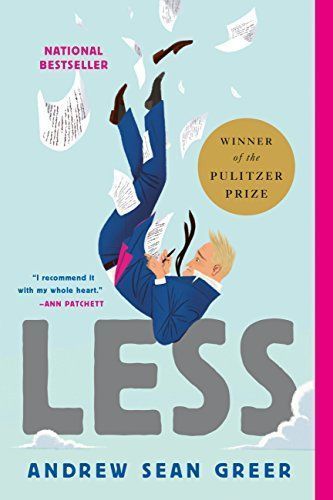
Less Winner of the Pulitzer Prize for Fiction 2018
WINNER OF THE PULITZER PRIZE FOR FICTION 2018 'You will sob little tears of joy' Nell Zink 'I recommend it with my whole heart' Ann Patchett 'I adore this book' Armistead Maupin 'Charming, languid and incredibly funny, I absolutely adored Arthur' Jenny Colgan 'Marvellously, endearingly, unexpectedly funny' Gary Shteyngart 'Bedazzling, bewitching and be-wonderful' New York Times Book Review 'A fast and rocketing read . . . a wonderful, wonderful book!' Karen Joy Fowler 'Hilarious, and wise, and abundantly funny' Adam Haslett 'Ideal for holiday reading' The Lady WHO SAYS YOU CAN'T RUN AWAY FROM YOUR PROBLEMS? Arthur Less is a failed novelist about to turn fifty. A wedding invitation arrives in the post: it is from an ex-boyfriend of nine years who is engaged to someone else. Arthur can't say yes - it would be too awkward; he can't say no - it would look like defeat. So, he begins to accept the invitations on his desk to half-baked literary events around the world. From France to India, Germany to Japan, Arthur almost falls in love, almost falls to his death, and puts miles between him and the plight he refuses to face. Less is a novel about mishaps, misunderstandings and the depths of the human heart.
Reviews
nico@smilemore
Tea@tealeafery
Eva Ströberg@cphbirdlady
Ryan Mateyk@the_rybrary
Ali@inblackink
Jenny Qian@jenqian
ash b@thevideodept
Sarah Pitts@sez
Kate@arienekatereads
deacon@deacon
Quinn Tenorio@qkt
kyra@witchfl00
Jule@julesandherbooks
Omar@omareduardo
Isabella@isabellareads
Lynn@lynncornelissen
Midori Kobayashi@snortingpages
Nick Gracilla@ngracilla
Taylor@taylord
Kathy Jedrzejczyk@kathyj84
Siya S@haveyoureadbkk
ni@poetics
Sonja H@sonjah
Floofyflower@jusalilfloof
Highlights
nico@smilemore
nico@smilemore
nico@smilemore
nico@smilemore
nico@smilemore
nico@smilemore
nico@smilemore
nico@smilemore
nico@smilemore
nico@smilemore
nico@smilemore
nico@smilemore
nico@smilemore
nico@smilemore
nico@smilemore
nico@smilemore
nico@smilemore
nico@smilemore
nico@smilemore
nico@smilemore
nico@smilemore
nico@smilemore
nico@smilemore
Bethany Jenkins@bluepenguin17